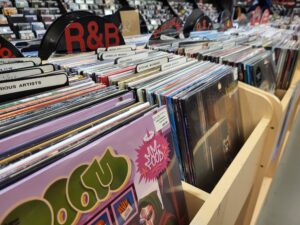For a long time, UK music fans have scratched their heads wondering why Robbie Williams has not become a household name in North America. Now, with the release of the movie Better Man, which depicts the rise and fall of the British singer, the question rises again.
To put his career into perspective we need to understand how big of a star Williams was in Europe. He sold over 85 million records worldwide, won 13 BRIT Awards, sold over 1.6 million tickets in one day (a record that stood until last year when Taylor Swift broke it), and sang for over 375,000 fans over three days at Knebworth in one of the biggest concerts in history.

Williams at his peak was one of the most famous artists in history, but why did he not break the North American market?
Williams has chimed in on this and has said before that his music is too British for American listeners. Yes, that is true—his records are quite British and differ from the pop rock that characterizes American artists. However, why didn’t that stop bands like The Beatles, The Rolling Stones, or Radiohead? Or singers like George Michaels, Amy Winehouse, and Elton John from breaking into the North American market? Their music style is not “American” either.
Some may say it’s because of his demeanour. Every single time he talks, Williams comes off as arrogant, and when he is not talking about himself he’s usually getting into it with other artists, like challenging Liam Gallagher during his acceptance speech at the BRIT Awards. Ironically, Oasis—the Gallagher brothers—are not exactly known for being the nicest of people, but for their antics and bad-boy personas. They were able to crack and become huge in the North American market, so we cannot solely blame it on his personality either.
I would describe this as the perfect storm. When Williams broke into the scene, North American audiences were not listening to that type of music. People were listening to grunge in Nirvana and dance-pop in bands like The Backstreet Boys. And when hip-hop jumped into the scene, people were listening to artists like Tupac and Biggie. Williams’ music did not fit into any of these categories, which made him irrelevant in North America. So not only did people not like him, but his music didn’t fit with the sounds of the time.
